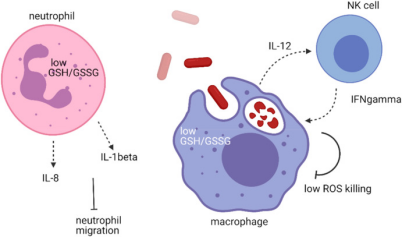Study on the action principle of glutathione in virus
Glutathione is widely distributed in gram-negative bacteria at concentrations in the millimolar range. It plays a variety of roles in virulence, activating virulence gene expression and promoting optimal biofilm formation. Glutathione can also be converted into hydrogen sulfide (H2S), which is essential for the pathogenesis of some bacteria. In addition to glutathione, other low molecular weight mercaptans, such as mycotic mercaptans and Bacillus mercaptans, which affect bacterial virulence, are also produced.
The related mechanism of glutathione in viruses
A research team from the National University of Singapore has conducted in-depth research on the function of regulating the host immune system to regulate the pathogenesis of bacteria. This study focuses on the mechanism of glutathione in viruses. Glutathione can directly control bacterial virulence through translational modification. Under acidic conditions, glutathione will damage and lyse dsDNA, resulting in damage to biofilm. In some bacteria, glutathione can be catabolic to produce H2S and produce virulence; In addition, MSH and BSH are functional equivalents of glutathione in some non-glutathione producing bacteria; The analysis showed that even though glutathione is not directly related to bacterial infections, it can have a broader effect on the immune system, which can interfere with immune function when attacked by pathogens, and thus act as an immune modulator.

Glutathione is a key REDOX system for metabolism and stability in many bacteria, and plays a role in bacterial pathogenicity mainly by maintaining optimal bacterial growth and survival. However, the way in which certain bacteria use glutathione as a reducing part of transcription factors or as an allosteric regulator to directly up-regulate toxicity is not well understood.
Some bacteria can alter many post-translational responses by glutathione of bacterial virulence factors. In addition, glutathione can modify REDOX sensitive transcription factors in bacteria and host cells, thereby affecting transcriptional changes. Many of these changes may be due to glutathione activation by enzymes and transcription factors, and changes in energy metabolism.
These complex changes affect the way the infection progresses in the mammalian host. The scientific direction of how glutathione regulates the immune response to infection has not been fully studied. The scientists anticipate that further investigation will lead to more examples of how different bacterial pathogens use glutathione to control their virulence, or how the host uses glutathione to regulate the response to these bacterial infections.
For more basic knowledge and basic techniques of custom peptide synthesis about glutathione , please visit the knowledge center of www.omizzur.com.
Read Related Articles:
Copyright © 2020 Omizzur Inc | Terms & Conditions | Privacy Notice | Sitemap